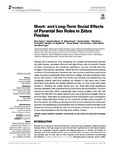Short- and Long-Term Social Effects of Parental Sex Roles in Zebra Finches
| dc.contributor.author | Pogány, Á | |
| dc.contributor.author | Morvai, B | |
| dc.contributor.author | Krause, ET | |
| dc.contributor.author | Kitsios, E | |
| dc.contributor.author | Böhm, T | |
| dc.contributor.author | Ruploh, T | |
| dc.contributor.author | von Engelhardt, N | |
| dc.contributor.author | Székely, T | |
| dc.contributor.author | Komdeur, J | |
| dc.contributor.author | Miklósi, Á | |
| dc.contributor.author | Krüger, O | |
| dc.date.accessioned | 2019-10-22T15:06:10Z | |
| dc.date.issued | 2019-08-07 | |
| dc.identifier.issn | 2296-701X | |
| dc.identifier.issn | 2296-701X | |
| dc.identifier.other | ARTN 294 | |
| dc.identifier.uri | http://hdl.handle.net/10026.1/15049 | |
| dc.description.abstract |
Parental care is among the most widespread and variable behavioral traits between and within species, associated often both with large fitness costs and benefits. Despite its fitness consequences and evolutionary significance, we know very little about the ontogeny of this behavior, specifically, whether and how social experiences from parents contribute to the development of parental care. Here we used a split-family experimental design to produce uniparentally raised zebra finch nestlings that were provisioned either only by their mother or their father from shortly after hatching until independence. We investigated whether zebra finch nestlings pay attention to who takes care of them (short-term social effects) and whether parental sex roles, i.e., how much each parent provides to offspring, are socially learned and how these early social experiences influence negotiation rules of parental effort as adults (long-term social effects). We found pronounced short-term effects: uniparentally raised young socialized more with their “caring” than with their “non-caring” parent in a two-way choice test and begged more for food from them. When paired as adults based on their caring parent, some combinations of these uniparentally raised finches did not coordinate normally during incubation as first-time parents. By nestling provisioning (and their second breeding) even these pairs assumed normal distribution of parental effort and we therefore conclude that early social experiences influence parental sex roles and coordination, but these can be overridden by own social experiences with the mate when starting to breed. | |
| dc.format.extent | 294- | |
| dc.language.iso | en | |
| dc.publisher | Frontiers Media | |
| dc.subject | parental coordination | |
| dc.subject | negotiation | |
| dc.subject | social learning | |
| dc.subject | sex roles | |
| dc.subject | parental care | |
| dc.subject | zebra finch | |
| dc.subject | Taeniopygia guttata | |
| dc.title | Short- and Long-Term Social Effects of Parental Sex Roles in Zebra Finches | |
| dc.type | journal-article | |
| dc.type | Journal Article | |
| plymouth.author-url | https://www.webofscience.com/api/gateway?GWVersion=2&SrcApp=PARTNER_APP&SrcAuth=LinksAMR&KeyUT=WOS:000479067700001&DestLinkType=FullRecord&DestApp=ALL_WOS&UsrCustomerID=11bb513d99f797142bcfeffcc58ea008 | |
| plymouth.issue | AUG | |
| plymouth.volume | 7 | |
| plymouth.publication-status | Published online | |
| plymouth.journal | Frontiers in Ecology and Evolution | |
| dc.identifier.doi | 10.3389/fevo.2019.00294 | |
| plymouth.organisational-group | /Plymouth | |
| plymouth.organisational-group | /Plymouth/Faculty of Science and Engineering | |
| plymouth.organisational-group | /Plymouth/Faculty of Science and Engineering/School of Biological and Marine Sciences | |
| plymouth.organisational-group | /Plymouth/REF 2021 Researchers by UoA | |
| plymouth.organisational-group | /Plymouth/REF 2021 Researchers by UoA/UoA04 Psychology, Psychiatry and Neuroscience | |
| plymouth.organisational-group | /Plymouth/Users by role | |
| plymouth.organisational-group | /Plymouth/Users by role/Academics | |
| dcterms.dateAccepted | 2019-07-24 | |
| dc.rights.embargodate | 2019-11-27 | |
| dc.identifier.eissn | 2296-701X | |
| dc.rights.embargoperiod | Not known | |
| rioxxterms.versionofrecord | 10.3389/fevo.2019.00294 | |
| rioxxterms.licenseref.uri | http://www.rioxx.net/licenses/all-rights-reserved | |
| rioxxterms.licenseref.startdate | 2019-08-07 | |
| rioxxterms.type | Journal Article/Review |


